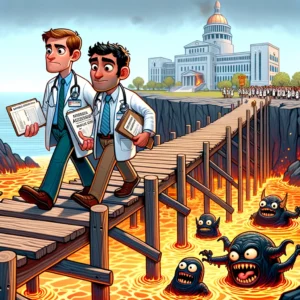
When I agreed to respond to ten common questions that MBA applicants had, I promised that I wouldn’t say “it depends” to every question… even though there isn’t just one right way to do things! That said, here are my responses to the 10 most common questions I’ve been asked in seminars and various other places where I work with clients.
As with most aspects of an MBA application, you can absolutely do this yourself, provided you’re a decent-to-strong writer and have the time and patience to get this right. If you’re not confident, then by all means, getting professional is a smart idea. At Gurufi, we’ve been doing this 2008, and in that time we’ve helped thousands of applicants get into their dreams schools, from Wharton and Harvard to the full range of part-time and executive MBA programs.
1. What is the most important element of an MBA personal statement?
The most important element of an MBA personal statement is authenticity. Admissions committees are looking for genuine insights into who you are, what motivates you, and how an MBA fits into your career aspirations. Authenticity helps convey your true personality, values, and goals, making your personal statement more relatable and compelling. Avoid trying to fit into a perceived mold of what an ‘ideal’ candidate should be; instead, focus on presenting your unique experiences and perspectives.
Though applicants tend not to think about this, you should also view this process as two-way: schools are assessing you, but you’re also using the various phases of the application to assess whether you would thrive at a given school. If you’re inauthentic, you’re unlikely to find a school that positions you for happiness and sustained excellence.
2. How can I demonstrate leadership in my MBA personal statement?
Tell stories of times when you demonstrated key elements of leadership! This typically involves highlighting specific examples of times when you have taken initiative, influenced others, and made a meaningful impact. Use concrete stories from your professional or extracurricular experiences to illustrate your leadership abilities. Describe the challenges you faced, the actions you took, and the outcomes of your efforts. Additionally, reflect on what these experiences taught you about leadership and how they have prepared you for future leadership roles in your career.
I have found that telling one or two stories really well, with well-chosen details and thoughtful self-reflection, is a more effective way to project your leadership abilities than listing off accomplishments. (save that for your CV!)
3. What mistakes should I avoid in my MBA personal statement?
Some common mistakes to avoid in your MBA personal statement include:
1. **Being too generic:** Avoid using clichés or generic statements that could apply to any applicant. Instead, focus on specific details that are unique to your experiences.
2. **Lack of focus:** Ensure that your personal statement has a clear and coherent narrative. Avoid jumping between unrelated topics. Every essay should have one clear, central theme or thread that connects everything.
3. **Neglecting to proofread:** Spelling and grammatical errors can undermine your professionalism. Proofread your essay multiple times and consider having someone else review it.
4. **Overemphasis on accomplishments:** While it’s important to highlight your achievements, don’t come across as arrogant. Balance your successes with reflections on your growth and areas for improvement.
4. How should I structure my MBA personal statement?
The real answer is that there’s not one correct way to do it, necessarily. For instance, you need not adhere to strict chronology. In fact, if done thoughtfully, you can jump around so long as your theme and progression come across clearly. But, if you’re just looking for a template, you can use this one:
- **Introduction:** Start with a compelling story that captures the reader’s attention and introduces the main theme of your essay. DO NOT think in terms of hooks or overly dramatic or clever openings. They more often come across as cheesy or forced.
2. **Body:** Divide the body into several paragraphs, each focusing on a specific aspect of your background, experiences, and goals. Use this section to provide detailed examples of your leadership, accomplishments, and learning experiences. For each paragraph, ask yourself three questions:
-How does this further my application?
-What does it say about me?
-How does it connect with the paragraphs before and after?
An essay that flows has clear, strong, and compelling answers to these questions.
- **Conclusion:** Summarize the key points of your essay and reiterate how an MBA will help you achieve your career aspirations. End with a strong closing statement that leaves a lasting impression. The best way to do this is to return to your introduction and sprinkle in words, references, or ideas that you began with. This helps to give the essay a sense of conclusion, and not just that it ends abruptly.
5. How can I highlight my career goals in an MBA personal statement?
To effectively highlight your career goals in your MBA personal statement, be specific about your short-term and long-term objectives. Explain how your past experiences have shaped these goals and why you are passionate about pursuing them. Discuss how an MBA from the specific program you are applying to will help you achieve your aspirations. Mention any particular courses, faculty members, or resources at the school that align with your career plans. This demonstrates that you have done your research and are genuinely interested in the program.
6. What role do extracurricular activities play in an MBA personal statement?
Extracurricular activities play a significant role in an MBA personal statement as they provide a fuller picture of who you are beyond your professional achievements. They can demonstrate leadership, teamwork, and time management skills. Highlight any roles where you took initiative, led a team, or made a significant impact. Discuss what you learned from these experiences and how they have prepared you for the challenges of an MBA program and your future career. Do be careful about just stuffing in stuff that isn’t relevant, though.
7. How can I make my MBA personal statement stand out?
Tell great stories and give a compelling vision of your FUTURE. The best piece of advice I can give to personal statement writers is that “the personal statement is about your future.” If you focus only on your past, it’s just a narrative CV. Obviously, you need to build the essay by referencing your past because past accomplishments / trajectory give context and credibility to your vision for your future.
Lastly, to make your MBA personal statement stand out, focus on authenticity, clarity, and compelling storytelling. Here are some tips:
1. **Be Yourself:** Let your unique voice and personality shine through your writing.
2. **Tell a Story:** Use a narrative structure to make your essay more engaging. Share specific anecdotes that highlight your key qualities and experiences.
3. **Show, Don’t Just Tell:** Use concrete examples to illustrate your points rather than making broad statements.
4. **Connect the Dots:** Clearly link your past experiences, present motivations, and future goals.
5. **Tailor to Each School:** Customize your personal statement for each program, highlighting why you are a great fit for their specific offerings.
8. How do I address a gap in my resume in my MBA personal statement?
Addressing a gap in your resume in your MBA personal statement involves honesty and framing the gap in a positive light. Briefly explain the reason for the gap without making excuses. Focus on what you did during that time, whether it was gaining new skills, volunteering, or personal development. Highlight any productive activities or learning experiences that occurred during the gap and how they have prepared you for an MBA program.
9. What are some tips for writing a compelling introduction for an MBA personal statement?
A compelling introduction sets the tone for your MBA personal statement and grabs the reader’s attention. Here are some tips:
1. Be willing to play with chronology. Think about the most pivotal moment in your professional life, and begin there. Tell that story. From there, you can in subsequent paragraphs rewind, reset, and contextualize. Use an interesting fact, a quote, or a brief anecdote to draw the reader in.
2. **Set the Scene:** Provide some context for your story or background.
3. **Introduce Your Main Theme:** Clearly indicate the main theme or message of your essay.
4. **Be Concise:** Keep the introduction short and to the point, leading smoothly into the body of your essay.
10. How should I conclude my MBA personal statement?
Your conclusion should reinforce the key points of your MBA personal statement and leave a lasting impression. Here’s how to craft a strong conclusion:
1. **Summarize Key Points:** Briefly recap the main themes of your essay without repeating them verbatim.
2. **Restate Your Goals:** Reiterate your career goals and how the MBA program will help you achieve them.
3. **End on a Strong Note:** Use a powerful closing statement or call to action that underscores your enthusiasm and readiness for the MBA program.
Writing an effective MBA personal statement requires careful thought, reflection, and planning. By addressing these common questions and incorporating the advice provided, you can craft a personal statement that authentically represents you, highlights your strengths, and demonstrates your readiness for the challenges and opportunities of an MBA program. Remember to be genuine, specific, and reflective in your writing, and you will create a compelling narrative that resonates with admissions committees.
For more help with your personal statement, check us out at Gurufi.com. Our personal statement editors and consultants have decades of experience helping clients get into top MBA programs. Our specialty is helping you craft compelling personal statements that move the needle in your admissions process! For questions, shoot us an email at service@gurufi.com. Check us out on Facebook, Twitter, and LinkedIn.


